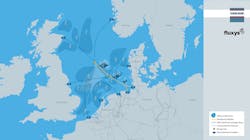Gascade, Fluxys step up plans for offshore hydrogen pipeline
Offshore staff
KASSEL/BRUSSELS — GASCADE and Fluxys have applied to the European Commission for Project of Common Interest status for the AquaDuctus project, marking a step forward in their plans for an offshore pipeline for green hydrogen in the North Sea.
"The offshore pipeline, which will be over 400 km long when completed, will become a linchpin of Germany's and Europe's future offshore hydrogen infrastructure," said GASCADE Managing Director Christoph von dem Bussche, emphasizing the project's European, interconnecting character.
The pipeline is designed as a "backbone" able to collect hydrogen from multiple production sites while also offering the potential to link up with other international hydrogen flows through the North Sea. Hydrogen will be taken to the German coast via the offshore pipeline and fed into the onshore hydrogen network there. In this way, AquaDuctus will provide large-scale offshore hydrogen infrastructure in the German North Sea for hydrogen to be imported into Germany.
GASCADE and Fluxys' first step will see the SEN-1 hydrogen wind farm connected to AquaDuctus, with flows to start in 2030.
In subsequent years, wind farms farther offshore in Germany's exclusive economic zone may be linked up as well as hydrogen infrastructure operated by other North Sea countries. By 2035 the offshore pipeline is to develop into a main hydrogen corridor carrying up to 1 MMtonnes of hydrogen a year into Germany. Based on the gas and hydrogen package being negotiated at European level, the two long-standing transmission system operators plan the AquaDuctus offshore pipeline as a regulated open access infrastructure available to all future operators of hydrogen wind farms, thereby strengthening security of supply in the future.
Studies identify up to 100 GW of hydrogen production potential in the German and European North Sea and view an integrated European offshore pipeline network as the ideal transport solution.
A comprehensive feasibility study for the project has been successfully completed. The study examined and confirmed the technical and planning feasibility of all phases of the project. Commercial aspects, marketing potential, pricing and regulatory design options were also analyzed.
01.23.2023
